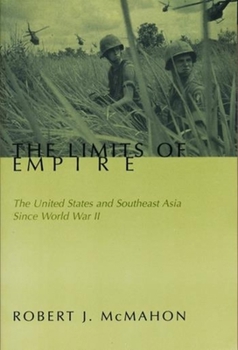The Limits of Empire: The United States and Southeast Asia Since World War II
Select Format
Select Condition 
Book Overview
In the years following World War II, as the United States began to focus on the global containment of communism, few regions of the world were considered as much of a potential battleground as Southeast Asia. Robert McMahon contends that policymakers exaggerated the significance of the region within the global power balance, dangerously overextending the United States and resulting in the tragedy of the Vietnam War.The first book to situate the Vietnam War in its broad, regional context, The Limits of Empire offers the most complete picture to date of how U.S. strategies of containment and empire-building spiraled out of control in Southeast Asia. Additionally, McMahon's analysis goes further than any previous study of U.S. security policy in Southeast Asia by following it through to the present, investigating how the demoralizing experience of Vietnam radically undermined U.S. enthusiasm for the region in a strategic sense. By conceptualizing the U.S. strategic mission as empire-building rather than merely containment, this book offers an insightful new way to understand America's failure in Vietnam--and also why this grim miscalculation did not lead to the balance-of-power catastrophe that some U.S. officials had forecasted. The Limits of Empire touches upon such broad theoretical concerns as the appeal of nationalist, anti-Western currents to Third World peoples; the inadequacy of empires as a means of asserting control over non-Western peoples; and the chasm between America's postwar ambitions and the sobering realization of the limits of its power.
Format:Paperback
Language:English
ISBN:0231108818
ISBN13:9780231108812
Release Date:February 1999
Publisher:Columbia University Press
Length:288 Pages
Weight:0.92 lbs.
Dimensions:0.7" x 6.2" x 8.7"
Grade Range:Postsecondary and higher
Customer Reviews
0 rating





